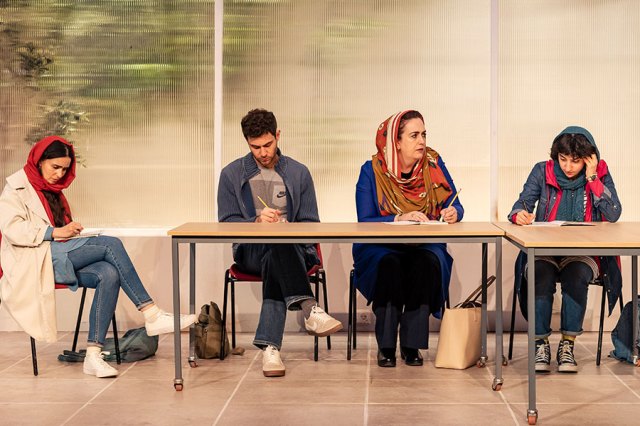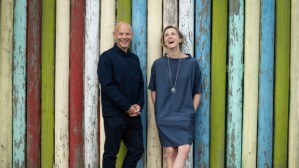English at the the Other Place in Stratford-upon-Avon – review
The RSC venue hosts the Pulitzer Prize-winning play for its European premiere

It feels a very long time since the Other Place played host to real theatre – and, indeed, it is. In the meantime, the RSC’s so-called ‘engine room’ for new writing has been stripped out, reconfigured and rebooted, with the European premiere of a Pulitzer Prize-winning play as its first incumbent, co-produced with the Kiln Theatre (where it will subsequently play later this summer).
Written by Iranian-American Sanaz Toossi, English is set in a classroom in Iran, where four students assemble for lessons in English as a foreign language, delivered by the confident but conflicted Marjan. Each has their own reasons for being there, which emerge sporadically over the course of the play’s 90 uninterrupted minutes, while Marjan herself has motivations behind her professional facade that will come to influence her students in different ways.
It seems such a simple – almost simplistic – set-up that it’s hard to believe that this quintet can be as engaging, provocative and ultimately moving as they are. But this is one of those productions in which all the creative elements come together to build a whole that is somehow more than the sum of its parts.
Director Diyan Zora maintains a delicate touch with Toossi’s contemplative script, but it’s clear there’s a lot of paddling going on beneath the surface. Anisha Fields has created a set that is both universally recognisable and distinctively specific, with Elliot Griggs’s lighting rendering the Iranian world beyond the classroom utterly believable. The clever trick of delivering bilingual dialogue alternately with and without heavy accents and stilted delivery, depending on the language being spoken, works superbly, and sets up a nuanced debate that covers every aspect of nationality, belonging and the status of the outsider.
Nadia Albina plays Marjan as a committed, vocational teacher whose internal flaws and struggles come drifting painfully to the surface as the classes roll out across six weeks of tuition. Her determination to speak only English – never Farsi – with her students falters along with her mask, and Albina delivers a subtle and compelling performance.
Her students are equally convincing, from Sara Hazemi’s innocent teenager Goli to Lanna Joffrey’s fretting grandmother, desperate to learn English to be able to communicate with her naturalised Canadian granddaughter Claire, whose name she cannot pronounce. Nojan Khazai is the only man in the class, with a suspiciously good grasp of English and an eye for the teacher that causes ructions, while Serena Manteghi is both fiery and flustered as the frustrated Elham, hoping to grasp enough colloquial platitudes to pass the English test.
It’s a complex weaving of stories and backgrounds and, perhaps inevitably, Toossi chooses not to resolve the various strands that cocoon her characters. But if this leaves the audience with a vague sense of dissatisfaction – accompanied by a deliberately alienating ending – there’s plenty of quality work on display from both cast and crew to make up for it.














